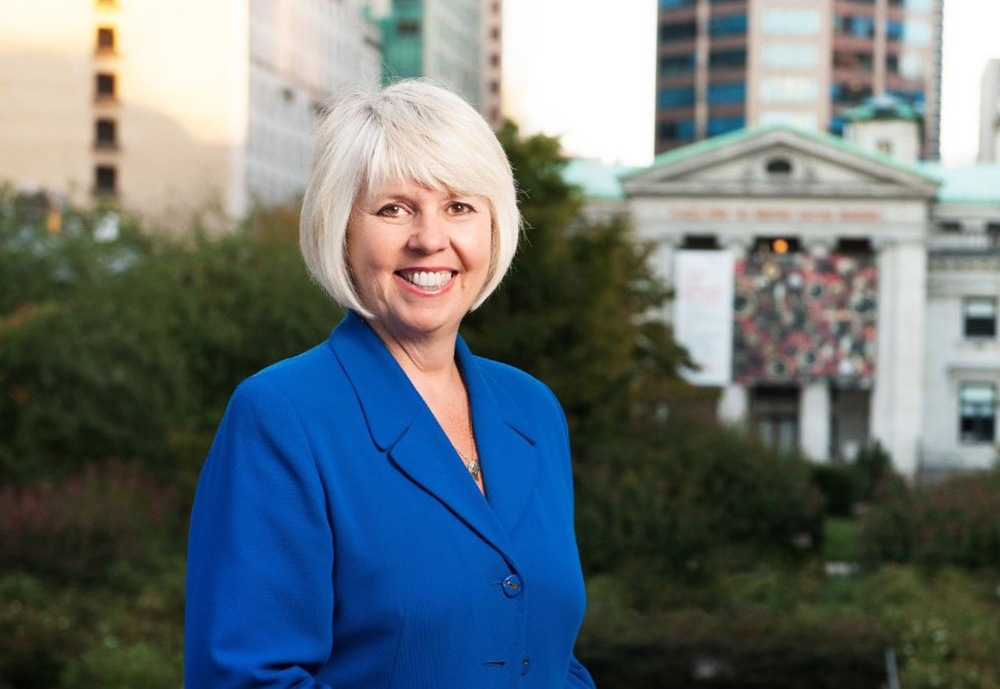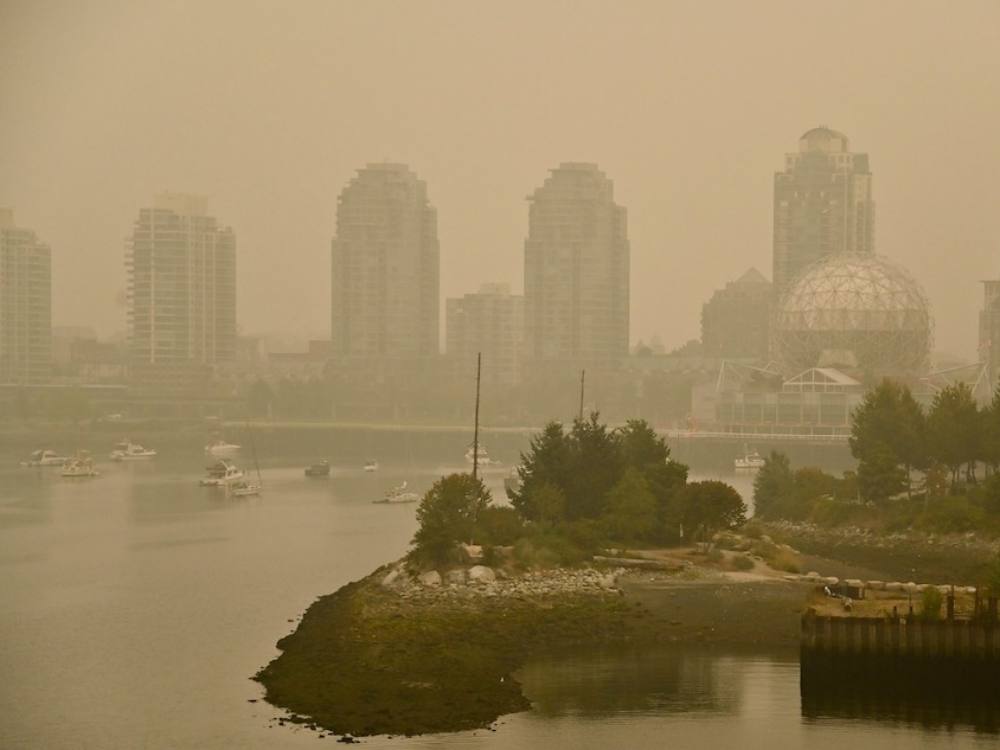Vancouver is on its way to becoming the first city in Canada to sue Big Oil for its role in causing the climate emergency.
City councillors have voted 6-5 in support of a motion that would set aside approximately $700,000 — or roughly $1 per every Vancouver resident — in order to fund litigation against the country’s biggest producers of oil and gas.
Companies such as ExxonMobil — which owns the Canadian oilsands producer Imperial Oil — are being singled out because they privately researched climate change decades before it was a mainstream issue and determined that burning fossil fuels creates grave global threats, according to extensive documentation surfaced by researchers and journalists.
But instead of acting on that life-saving information, Exxon and others then ran media campaigns throughout the 1990s and 2000s — crucial decades for getting the climate emergency under control — to convince the public that human-induced warming isn’t real. It’s an alleged disinformation campaign that continues to this day.
“There are companies that absolutely knew that if they continued to sell their products it would increase greenhouse gas emissions,” Adriane Carr, the Green Party of Vancouver city councillor who is lead sponsor on the lawsuit motion, told The Tyee. “They knew that would create climate change and that would have damaging effects on people.”
Vancouver is now footing the bill for decades of oil industry denial, Carr said, spending roughly $50 million per year in order to deal with and prepare for the impacts of climate change. That includes last year’s heat dome, which led to 99 deaths in the city proper and more than 390 deaths across the Lower Mainland. It also includes last November’s catastrophic flooding, which the Insurance Bureau of Canada now estimates led to $675 million in insured damage.
Carr says she hopes Vancouver can win a settlement against Canada’s largest oil companies and emitters in order to recoup some of those costs.
“This is a fiscally prudent move,” she said. “It’s not extreme at all. What’s extreme is continuing to pollute our air with greenhouse gases that threaten life on this planet.”
A building wave of US lawsuits
No Canadian city has yet taken Big Oil to court over climate denial and delay, but such litigation is becoming more common in the U.S., where more than 20 jurisdictions have filed lawsuits asking fossil fuel polluters to pay for the damage caused by their products.
That includes an ongoing lawsuit in Colorado, which names Calgary-based Suncor, one of the biggest polluters in the state and also a major oilsands producer in Canada, as a defendant. Exxon is named in that case as well.

A big factor in spurring these lawsuits was investigative reporting from media outlets such as Inside Climate News and the Los Angeles Times, which several years ago revealed “How Exxon conducted cutting-edge climate research decades ago and then pivoted to work at the forefront of climate denial, manufacturing doubt about the scientific consensus that its own scientists had confirmed.”
That narrative has gone increasingly mainstream in the U.S., with Congress holding hearings into Big Oil’s disinformation efforts last fall and Kamala Harris, now vice-president, even promising in 2019 that “Everyone that was part of misinforming the public, misleading the public and false advertising should be held accountable.”
That conversation isn’t taking place at nearly the same level in Canada. “We’re not there yet,” Martin Olszynski, an associate law professor at the University of Calgary who has closely followed climate litigation efforts, told The Tyee.
In 2018, for example, the mayor of Whistler apologized after sending a letter to more than a dozen oil and gas producers concerning the “climate-related harm caused in our community by your products.”
“We were tone deaf. We do, as a resort depend on oil and gas,” mayor Jack Compton said after his letter caused outrage among fossil fuel companies and conservative politicians.
A lot has shifted since then, however. “We’ve had the heat dome, we’ve had the town of Lytton be vaporized, we’ve had the washing out of Highway 1 in last year’s floods,” Olszynski said. Climate change feels more real to many Canadians than even several years ago. And this is emboldening cities like Vancouver to go after the companies most responsible for it, he explained.
After this step, what’s next?
The recent city council vote is just a first step. No litigation has yet been filed, and the $700,000 funding commitment could be vetoed if Vancouver civic elections in October lead to a city council no longer interested in suing Big Oil.
Still, it’s being celebrated as a “historic” win by West Coast Environmental Law and other advocacy organizations trying to build a popular movement around bringing legal accountability to Canada’s oil and gas industry.
“[We] call on other B.C. local governments to match Vancouver’s commitment,” West Coast Environmental Law staff lawyer Andrew Gage, said in a statement. “When oil giants like Shell, Chevron, ExxonMobil and others face financial and legal risks for the damages caused by their products, they, as well as investors and governments, will start making business decisions that are better for our future.”
If and when an actual lawsuit is filed, there will be plenty of historical material for courts to consider. One of the oil executives involved in creating the first oilsands project in Alberta, Robert Dunlop, was warned about the dangers of climate change as early as 1959. Dunlop’s company Sun Oil later changed its name to Suncor in Canada.
Imperial Oil, another early oilsands producer owned by Exxon, produced an internal report in 1980 stating that “it is assumed that the major contributors of CO2 are the burning of fossil fuels.... There is no doubt that increases in fossil fuel usage and decreases of forest cover are aggravating the potential problem of increased CO2 in the atmosphere.”
Yet in the late 1990s, then-Imperial chairman Robert Peterson publicly called the link burning fossil fuels and dangerous climate change an “unproven hypothesis.”
Part of the reason Carr wants Vancouver to sue Big Oil is to “draw attention” to the Canadian oil patch’s own role in spreading disinformation. “I don’t think people are very aware of that history,” she said. ![]()
Read more: Energy, Rights + Justice, Municipal Politics, Environment
















Tyee Commenting Guidelines
Comments that violate guidelines risk being deleted, and violations may result in a temporary or permanent user ban. Maintain the spirit of good conversation to stay in the discussion.
*Please note The Tyee is not a forum for spreading misinformation about COVID-19, denying its existence or minimizing its risk to public health.
Do:
Do not: